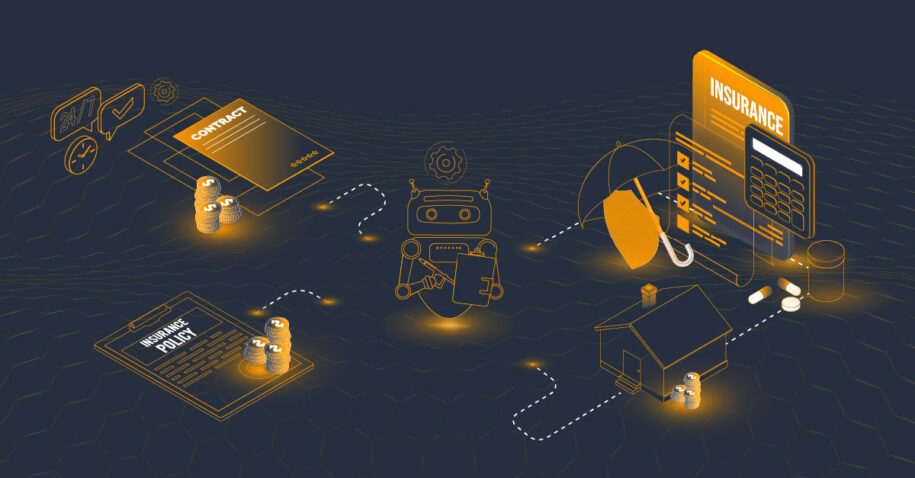The insurance industry routinely works on tasks involving mass data and its evaluation. Therefore, the insurance sector remains under constant pressure to remain relevant amidst rapidly changing trends. For the industry to evaluate data smoothly, it is imperative to have advanced solutions at its disposal. The industrial landscape has rapidly transformed by expanding automation with demonstrated benefits. As a result of AI’s important role in increasing productivity, reducing dependency on human resources, and lowering costs, the insurance industry is rapidly gaining momentum with the aid and assurance of artificial intelligence. Along the whole insurance value chain, many insurance service providers have been quick to automate repetitive operations or support human decision-making.
The introduction of AI in insurance is the relevant response to all the challenging issues in industry. By implementing AI, the sector might have less human dependence. Once AI is operational, the generated models quickly and accurately make judgments based on evidence, ultimately enabling businesses to operate more efficiently.
The insurance industry is embracing new technologies to solve some of its key client issues, such as addressing client experience, insurance pricing, claims reserve optimization, AI-powered inspection of sites, and fraud detection by using machine learning (ML), natural language processing (NLP), and AI in insurance industry.
“According to a Genpact Survey, 87% of surveyed insurers already see their companies invest $5 million or more in AI technology each year.”
In this blog, we will discuss AI in insurance, the benefits of AI in the insurance industry, critical use cases, and the future of AI in the insurance industry.
What Does AI in Insurance Mean?
AI in insurance means effectively implementing the advanced technology once insurers figure out where it fits into the digital insurance continuum. With advanced machine learning algorithms, underwriters bring more information to better gauge risk and offer tailor-made premium pricing. Therefore, AI is streamlining the insurance process on the back end to connect applicants with carriers more efficiently and with fewer errors.
Consumer behavior and technological advances have opened the door for AI in the insurance market to create value, reduce costs, increase efficiency, and achieve higher customer satisfaction and trust.
Check out Potential of Artificial Intelligence in the Healthcare Industry.
Benefits of AI in the Insurance Industry
AI in insurance enables automating the underwriting process. Insurers are now using AI-powered algorithms to analyze data and make decisions about risk. Using AI saves time and results in more accurate underwriting decisions. Some of the most prevalent benefits of AI in insurance industry are the following:
- Increased efficiency in claims reporting
- Streamlined day-to-day operations
- Reduced dependency on human resources, lowering chances of error
- Fraud detection in real time and prevention with AI driven claims predictions
- Swift damage estimation and control

Use of AI in the Insurance Industry
Machine learning and artificial intelligence are significant forces behind progress in many industries. Many operations currently carried out by humans can be completed by algorithms and robots at a considerably cheaper cost and with much higher speed and efficiency.
Organizations are rapidly equipping themselves with AI and ML to access a plethora of advantages in automating production, distributions and services. The insurance industry is no exception in using AI in its operations. We are already seeing how insurance tech companies are gaining a significant market share at the expense of larger, more established enterprises.
This blog shares prominent use cases where artificial intelligence and automation impacts the insurance industry

Insurance Pricing and Underwriting
Risk management and the eventual financial success of insurance firms depends on the proper pricing of insurance products. Pricing and premiums are typically determined using statistical techniques like generalized linear models. Researching the customer’s risk profile in-depth is necessary for risk evaluation and pricing. As a result, manual underwriting is time consuming, is prone to mistakes, and may result in ineffective pricing. Which is why risk pricing and underwriting procedures are best suited for AI.
Optimizing Insurance Claims with AI
Due to inefficiencies in claims registration, insurance companies must optimize their operations with AI. The repetitive and data-intensive process results in operational inefficiencies. AI-based insurance solutions help in claim reserve optimization through:
- Fast and accurate handling of claims estimation in real-time
- Early detection of fraudulent attempts
- Inspection of hazardous locations
Identifying and Preventing Fraud
By detecting fraudulent claims, AI in insurance plays a significant part in identifying insurance scams. As a result, insurers can achieve an efficient and effective claims management system. AI is already operational in many ways, from intelligent chatbots that offer 24/7 customer service, to machine learning technologies that bolster processes through automation.
Automated Inspection Using AI
The use of AI in insurance in automated inspection is to verify underwriting and claim decisions. The review can occur before coverage, initiation, or renewal.
Insurance techs are using drones equipped with cameras to discover potential problems with the structural integrity of buildings or other structures. For instance, technology now allows for the recording and analysis of photographs of rooftops to spot any potentially cracked tiles that could result in water damage and require maintenance. It is safe to say that the benefits of automation in insurance industry are powering the industry.
AI-based Customer Support
Artificial intelligence applications for customer support can reduce the amount of labor-intensive effort, saving time and reducing costs significantly. By transforming customer service interactions, AI-powered enabled solutions are ready to boost and enhance every element of your business, including customer experience, loyalty, online brand reputation, and the creation of new revenue streams.
Read more about how artificial intelligence is improving Customer Experience?
Personalization is the Current and the Future
Customers have diverse needs, interests, and lifestyles. They anticipate customized rules, loyalty schemes, and advice based on their unique tastes and characteristics.
“According to McKinsey, satisfied customers are 80% more likely to renew their current policy.”
AI insurance companies are beginning to provide tools that offer personalized insurance plans based on machine learning and artificial intelligence models trained on individual customer preferences, such as personalized recommendation systems.
The Future of AI in the Insurance Industry
AI in insurance can transform the insurance sector from its current state of detection and repair to prediction and prevention by using a new wave of deep learning techniques. Change is quick as brokers, customers, financial intermediaries, insurers, and suppliers grow more skilled at using cutting-edge technologies to boost decision-making and productivity, reduce costs, and maximize the client experience. The foundational technologies of AI are already running in our workplaces, homes, cars, and environment. Over the next ten years, technological advances, such as the increased prevalence of robots, advances in cognitive tech, and the use of data closely related to AI, will change the shape of the insurance industry.
Conclusion
The insurance sector is undergoing a revolution thanks to AI. Customers might benefit from a smoother user experience and more reasonable prices. At the same time, insurance providers may make more money by streamlining their procedures or providing AI-powered auto insurance coverage. The potential and future of AI in insurance industry is endless, and it won’t be long before we witness these advancements even further.
The future of artificial intelligence in insurance sector is about to change. You can rely on NETSOL Cloud Services to be your trustworthy development partner while you take advant



Leave a Reply